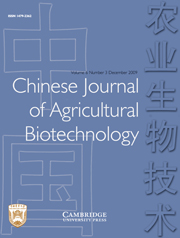No CrossRef data available.
Article contents
Cloning and characteristics of a novel gene HbUEP from latex in Hevea brasiliensis
Published online by Cambridge University Press: 01 October 2008
Abstract
HbUEP, an ubiquitin extension protein gene from latex of the rubber tree (Hevea brasiliensis) was cloned and sequenced using a differentially ethphon-induced expressed cDNA subtraction library. The cDNA had 771 bp nucleotides, comprising a 226 bp 3′ untranslated region (UTR), 77 bp 5′UTR and a 468 bp open reading frame encoding a 156 amino acid peptide. Southern blotting analysis showed that this gene was a low copy number gene in the H. brasiliensis genome. Within 24 h after application of ethphon, the gene was expressed weakly in both control and latex sampled at 6 h, and strongly in latex sampled at 12 h, showing that this gene expression could be regulated by ethphon. Ethphon could increase the latex yield in H. brasiliensis. It is suggested that the HbUEP gene may be involved in the regulation of ethphon-induced high latex yield in H. brasiliensis.
- Type
- Research Papers
- Information
- Copyright
- Copyright © China Agricultural University 2008
Footnotes
First published in Journal of Agricultural Biotechnology 2008, 16(2): 305–308


